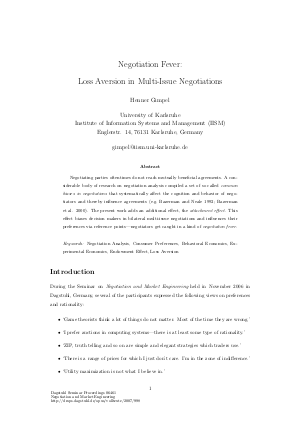Negotiation Fever: Loss Aversion in Multi-Issue Negotiations
Author Henner Gimpel
-
Part of:
Volume:
Dagstuhl Seminar Proceedings, Volume 6461
Part of: Series: Dagstuhl Seminar Proceedings (DagSemProc) - License:
 Creative Commons Attribution 4.0 International license
Creative Commons Attribution 4.0 International license
- Publication Date: 2007-05-10
File

PDF
DagSemProc.06461.13.pdf
- Filesize: 134 kB
- 4 pages
Document Identifiers
Subject Classification
Keywords
- Negotiation Analysis
- Consumer Preferences
- Behavioral Economics
- Experimental Economics
- Endowment Effect
- Loss Aversion
Metrics
- Access Statistics
-
Total Accesses (updated on a weekly basis)
0Document
0Metadata
Abstract
Negotiating parties oftentimes do not reach mutually beneficial agreements. A considerable body of research on negotiation analysis compiled a set of so called common biases in negotiations that systematically affect the cognition and behavior of negotiators and thereby influence agreements. The present work adds an additional effect, the attachment effect. This effect biases decision makers in bilateral multi-issue negotiations and influences their preferences via reference points---negotiators get caught in a kind of negotiation fever.
Cite As Get BibTex
Henner Gimpel. Negotiation Fever: Loss Aversion in Multi-Issue Negotiations. In Negotiation and Market Engineering. Dagstuhl Seminar Proceedings, Volume 6461, pp. 1-4, Schloss Dagstuhl – Leibniz-Zentrum für Informatik (2007)
https://doi.org/10.4230/DagSemProc.06461.13
BibTex
@InProceedings{gimpel:DagSemProc.06461.13,
author = {Gimpel, Henner},
title = {{Negotiation Fever: Loss Aversion in Multi-Issue Negotiations}},
booktitle = {Negotiation and Market Engineering},
pages = {1--4},
series = {Dagstuhl Seminar Proceedings (DagSemProc)},
ISSN = {1862-4405},
year = {2007},
volume = {6461},
editor = {Nick Jennings and Gregory Kersten and Axel Ockenfels and Christof Weinhardt},
publisher = {Schloss Dagstuhl -- Leibniz-Zentrum f{\"u}r Informatik},
address = {Dagstuhl, Germany},
URL = {https://drops.dagstuhl.de/entities/document/10.4230/DagSemProc.06461.13},
URN = {urn:nbn:de:0030-drops-9982},
doi = {10.4230/DagSemProc.06461.13},
annote = {Keywords: Negotiation Analysis, Consumer Preferences, Behavioral Economics, Experimental Economics, Endowment Effect, Loss Aversion}
}
